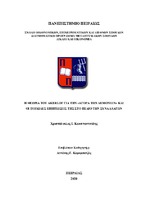Η θεωρία του Akerlof για την "αγορά των λεμονιών" και οι ποικίλες επιπτώσεις της στο πεδίο των συναλλαγών

View/
Abstract
This paper, prepared as a thesis in the Master's Degree in Law and Economics of the University of Piraeus, deals with the conclusions of the behavioral Economist George Akerlof in his classic study of "Lemons Market: Market Mechanisms and Uncertainty", first published in 1970 and for which he was awarded the Nobel Prize in 2001.
Akerlof, possessing a spirit of pervasive and obvious social sensitivities, highlights the phenomenon of information asymmetry and examines its various effects on the trading field, demonstrating through economic analysis that information mismanagement is one of the key factors in market, with extreme consequence even of its collapse. It finds that the most complete and impartial information available can solve the problems that arise, shielding purchasing decisions and leading to timely choices that ensure sound practices.
Where this is not possible, there is a need to take measures to avoid adverse choices, which clearly works to protect consumer interests. It is therefore right to acknowledge the important contribution of this theory to the shaping of modern consumer protection legislation.
At the same time, there is a growing concern about the appropriate form of selective regulatory law between paternalism and the freedom of private will, which is one of the key pillars of Private Law.
In this context, reference is made to the research and related theories of Economic Analysis of Law, with emphasis on the most up-to-date, broader legal methodological stream, that of Behavioral Economic Analysis of Law, and the original and extremely interesting proposals for establishing a coherent legal framework to the liberal spirit of Private Law that will guide, without coercion and facilitate rational decision-making, helping to normalize trade relations, and the efficient and thus cost-effective functioning of the market.

